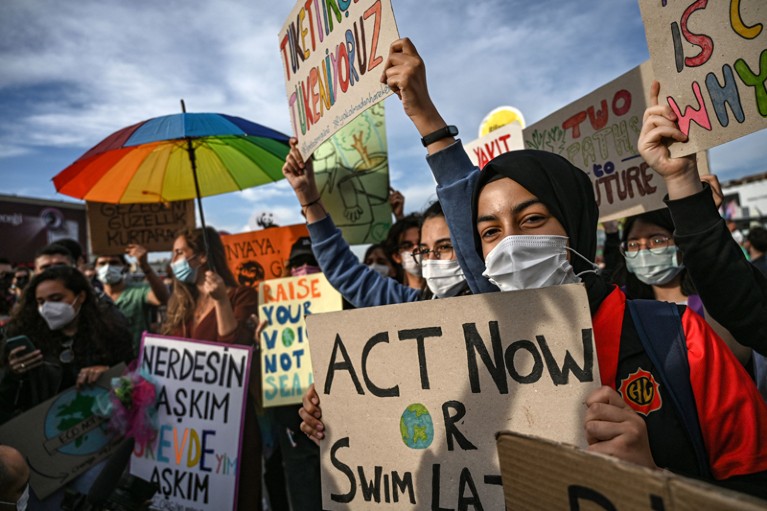
Teenage climate activists are reading and quoting from reports of the Intergovernmental Panel on Climate Change.Credit: Ozan Kose/AFP/Getty
The teenage climate campaigner Greta Thunberg spoke for many Nature readers in August when she summed up the latest report from the Intergovernmental Panel on Climate Change (IPCC) as a “solid (but cautious) summary” of the best available science. “It confirms what we already know from thousands of previous studies and reports,” she said. “It doesn’t tell us what to do. It is up to us to be brave and take decisions based on the scientific evidence provided in these reports.”
As world leaders prepare to travel to Glasgow, UK, for the 26th Conference of the Parties (COP26) to the United Nations climate convention, they would be wise to listen to the science-led youth movements, and to an emerging generation of young climate scientists.
Young people are reading and engaging with climate and biodiversity science and policy in a way that previous generations haven’t. They have good reason to: without action, their futures will be increasingly dominated by the heatwaves, storms and floods that have featured in climate projections since an early IPCC report in 1990 opened with a foreword calling global warming “potentially the greatest global environmental challenge facing mankind”.
The broken $100-billion promise of climate finance – and how to fix it
“People are suffering. People are dying. Entire ecosystems are collapsing,” Thunberg said at a UN climate-action summit in New York City in 2019. “We are in the beginning of a mass extinction, and all you can talk about is money and fairy tales of eternal economic growth.”
The Glasgow meeting, which takes place from 31 October to 12 November, is not about a new international agreement — that happened in Paris in 2015, when nations agreed to limit warming to between 1.5 and 2 °C above pre-industrial levels. Instead, it will see countries report their progress (or lack thereof) towards cutting emissions, and lay out their plans to become carbon neutral over the next decade. There are clear signs that some change is under way. Humanity’s use of oil might already be levelling off — not because oil is running out, but because of the transition to electric vehicles, rising fuel efficiency and the falling costs of electricity from renewable sources. Support for new coal-fired power is falling in Europe and the United States, and China has pledged to stop financing new coal plants abroad.
Replacing fossil fuels is one section (although admittedly a large one) of a thousand-piece jigsaw. The scale of the net-zero challenge is like nothing that has come before. Tackling global warming requires a revolution in how economies are run, and in the choices world leaders must make. Energy and industry, agriculture, financial services, transport and much more must be transformed. Natural ecosystems that absorb carbon emissions need protection. But as of now, the prospects for Glasgow are anything but optimistic.
Why fossil fuel subsidies are so hard to kill
Many countries — especially those that have contributed the least to the world’s carbon emissions, but stand to lose the most from a climate crisis — are rightly demanding action from rich nations. But leadership and resources are both in short supply. The Paris agreement requires countries to report on and update their climate pledges every five years. This timing allows emissions-reduction pledges to be adjusted to match the latest scientific assessments on what needs to be done to limit warming to 1.5–2 °C. Forty-eight countries — including major emitters — are yet to set new targets, and some clearly have no plans to accelerate their climate ambitions. In addition, the leaders of some of the largest nations — including Brazil, China, India and Russia — have not yet even committed to attending COP26.
At COP15 in Copenhagen in 2009, the richer countries agreed that by 2020, they would be providing US$100 billion per year in financial assistance to less wealthy nations. What counts as climate finance was never defined, but even by their own — highly controversial — accounting, they have yet to meet that requirement. Even if they do, the majority of pledges will be for loans, not grants.
This is where the new generation of climate researchers and campaigners can expect to make its mark. Glasgow marks the first time that countries must explain, in public, whether their actions will achieve climate targets, according to projections from research. Climate laggards, and countries that are not fulfilling their funding pledges, will be called out — regardless of whether their leaders attend.
For generations, world leaders have, in principle, accepted that the planet must be habitable for those that come after them. But this promise was never kept, perhaps because ‘future generations’ were not much more than words in a policy document. Now, that has changed. New generations are making themselves heard. Some of their representatives are being consulted as part of COP26; tens of millions more will be outside. They are reading climate science, and using that knowledge to argue for honesty and meaningful action from their leaders. Those attending COP26 would be wise to listen to their arguments, and involve them in decisions that will affect their futures more than anyone else’s.

 The broken $100-billion promise of climate finance – and how to fix it
The broken $100-billion promise of climate finance – and how to fix it
 Why fossil fuel subsidies are so hard to kill
Why fossil fuel subsidies are so hard to kill
 Global climate action needs trusted finance data
Global climate action needs trusted finance data
 Act now and avert a climate crisis
Act now and avert a climate crisis
 China’s pledge on overseas coal — by the numbers
China’s pledge on overseas coal — by the numbers







